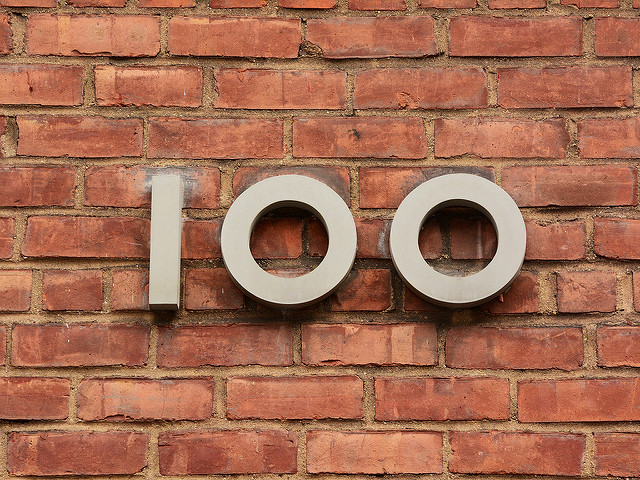
Need to take the TOEFL for school? Then you might be wondering whether a TOEFL 100 is a good score. Is 100 high enough to get you admitted to your schools? Or should you aim higher?
In this article, we’ll discuss whether a TOEFL 100 is a good score and how competitive it is for undergraduate and graduate students. Then, we’ll explain how important TOEFL scores are for admission before giving you tips on how to raise your 100 TOEFL score to 105 and 110.
Feature image: Robert/Flickr
TOEFL Score 100: Is This a Good Score?
First off, is a TOEFL 100 a good score? The truth is, it depends on the schools you’re applying to. Essentially, a good TOEFL score is any score that meets all of your schools’ minimum TOEFL score requirements (thereby increasing your chances of getting accepted to them).
Alternatively, we can use percentiles to determine whether a 100 TOEFL score is good or not. As a reminder, percentiles tell us what percentage of test takers scored lower than a particular score threshold. The higher your TOEFL percentile is, the better your score is (compared to those of other test takers).
Generally speaking, anything above the median (50th percentile) is considered a good score and anything above the 75th percentile a great score. According to official TOEFL percentiles for all test takers, a TOEFL 100 score falls in around the 80th percentile, placing it well above “good” and just slightly above “great.”
However, percentiles can change depending on class level. For example, a 100 TOEFL score rises from the 80th to the 88th percentile when taking into account only high school students’ TOEFL scores.
By the way: we have built the world's best online TOEFL course. Get online practice (TPO-sytle!) and individual grading and feedback on Speaking and Writing.
To be fair, it's possible to get a good TOEFL score studying alone. But PrepScholar is the world's most effective TOEFL course if you are worried about the TOEFL and are struggling to improve your score.
Learn how you can improve your TOEFL score by 15 points today.
Here are the percentiles a TOEFL 100 score falls in for different class levels:
| Academic Level | Percentile for 100 TOEFL Score |
| High School Students | 88 |
| Two-Year College Students | 89 |
| Undergraduate Students | 82 |
| Graduate Students (Non-Business Programs) | 76 |
| Graduate Students (Business Programs) | 75 |
| Applicants for English-Language Schools | 85 |
As this chart indicates, a single TOEFL score can change percentile fairly significantly depending on which class level you look at. In general, as academic level rises, the percentile for a TOEFL 100 score falls, showing that the more educated you are, the more likely you are to score higher than 100.
Let’s look at the data more closely. For high school students, 100 is an excellent score in the 88th percentile. Getting this score as a high school student means you’re scoring better than most other high school test takers.
On the other hand, for graduate students (business and non-business), 100 places you a little lower in the 75th or 76th percentile. Graduate students typically have better English skills than high school students and thus tend to score higher on the TOEFL. As a result, we can say that 100 is a great, but not excellent, score for graduate students.
Percentiles are just one way to determine how good a TOEFL score is. Ultimately, it’s not about what percentile you’re in but whether your TOEFL score is high enough to meet your schools’ minimum TOEFL requirements.

How Competitive Is a TOEFL 100?
A 100 TOEFL score is a fairly competitive score.
In regard to English-language ability, a 100 indicates you are great, though not perfect, at English. According to ETS, scoring around 25 on Reading, Listening, and Writing places you in the highest ranges of “high” or “good.” However, a 25 on Speaking places you one tier below in the “fair” range.
To improve your section scores (and thus your range), you must hone your English skills accordingly. For example, for Speaking, ETS recommends opening your mouth more widely as you talk and practicing answering topics with limited preparation time. You can find more tips online at the ETS website.
So what schools can you get into with a 100? A TOEFL 100 score fulfills the minimum TOEFL requirements of most fairly selective schools and programs, including Ivy League schools.
According to US News, the average TOEFL score required for admission (for undergraduates) to US universities is 78. A score of 100 places you well above this threshold, making it high enough for most schools.
In fact, 100 is one of the most common cutoffs for competitive schools. For undergraduates, 100 is usually the highest minimum TOEFL requirement you’ll encounter. For graduate applicants, 100 is a common requirement, though it’s not unusual for more selective programs to go up to the 105-110 range.
For undergraduate applicants, minimum TOEFL scores are typically set by the entire college or university. For graduate applicants, minimum TOEFL scores often vary by program. Below, we give you the TOEFL score requirements for various undergraduate schools and graduate programs.
Undergraduate Schools You Meet the Recommended TOEFL Score For
| School | Minimum Required TOEFL Score | Recommended TOEFL Score |
| Boston University | — | 90-100 |
| UCLA | — | 100 |
| University of Chicago | — | 100 |
| Cornell | — | 100 |
| MIT | 90 | 100 |
| NYU | — | 100 |
| Notre Dame | — | 100 |
| Vanderbilt | — | 100 |
| University of Washington | 76 | 92 |
| Yale | — | 100 |
Undergraduate Schools You Meet the Minimum TOEFL Score For
| School | Minimum Required TOEFL Score | Recommended TOEFL Score |
| Amherst | 100 | — |
| Brown | 100 | — |
| Claremont McKenna | 100 | — |
| Columbia | 100 | — |
| University of Michigan | 100 | — |
| Northeastern | 92 | — |
| Rice | 100 | — |
| University of Rochester | 100 | 107 |
| USC | 100 | — |
| Tufts | 100 | — |
Undergraduate Schools You Need to Work a Little Extra Harder For
| School | Minimum Required TOEFL Score |
| Carnegie Mellon | 102 |
Graduate Programs You Meet the Minimum TOEFL Score For
| Program | Minimum Required TOEFL Score |
| Northwestern — Doctor of Musical Arts | 95 |
| University of Pittsburgh — MBA | 100 |
| Stanford — Education PhD | 100 |
| Rensselaer Polytechnic Institute — Mechanical Engineering | 100 |
| Columbia — Economics PhD | 100 |
| Harvard — LLM | 100 |
| Tufts — Biomedical Sciences MS | 100 |
| MIT — Chemistry PhD | 100 |
| American University — Psychology MA | 100 |
Graduate Programs You Need to Work a Little Extra Harder For
| Program | Minimum Required TOEFL Score |
| NYU — Design for Stage and Film MFA | 105 |
| Texas A&M — Finance MS | 105 |
| Harvard — Education | 104 |
| Cornell — Systems Engineering | 105 |
| Duke — Master of Theology (ThM) | 108 |
| Columbia — LLM | 105 |
| UC Davis — Doctor of Veterinary Medicine | 105 |
| University of Chicago — Physics PhD | 102 |
| Yale — Global Affairs MA | 102 |

How Important Is Your TOEFL Score for Admission?
Ultimately, is your TOEFL score important for admission? The answer is, generally yes—but this depends on whether your school requires a particular minimum TOEFL score or not.
If your school requires a minimum TOEFL score, you must get at least this score to qualify for admission. Not getting this score makes you ineligible for admission (unless the school offers conditional admission). For example, Brown requires a minimum 100 TOEFL score for undergraduate admission, so if you score lower than this, you won’t get accepted!
If your school recommends a TOEFL score but does not require one (or requires one lower than the recommended score), aim for the recommended score. Though you don’t need to get this exact score to qualify for admission, reaching (or exceeding) it will significantly raise your chances of getting accepted. For example, the University of Rochester requires a minimum 100 TOEFL score but recommends getting at least 107.
Now, what if you score well above your school’s required or recommended TOEFL score? Usually, this won’t give you much of an advantage (if any at all). Most schools just want to see that you have the minimum level of English proficiency needed to do well in school. Thus, there’s not much of a difference between scoring higher than the minimum TOEFL score and scoring exactly at it.
That said, sometimes scoring a lot higher than a minimum could benefit you by acting as a tipping point in your favor if the admission committee is stuck between you and a similar candidate.
How to Take Your TOEFL 100 to 105 or 110
A TOEFL 100 is a very good score but not always high enough for admission. If you currently have a 100, how can you improve your score so that you’ll have a better chance of getting accepted to your schools?
Start by calculating how many hours you need to study to hit your goal score (i.e., the score that meets the minimum requirements for all of your programs). For this section, we’ll cover two common TOEFL benchmarks: 105 and 110.
Next, subtract your current score (in this case, 100) from your goal score (105 or 110) to get the number of points you need to improve by. For example, if I have 100 but want 105, I’ll need to improve by 5 points. If, on the other hand, I have 100 but want 110, I’ll need to improve by 10 points.
Once you’ve found the difference between the two scores, use the following chart to roughly estimate the number of hours you’ll need to study for each TOEFL section:
| Section | Study Hours for 1-Point Improvement |
| Reading | 6-8 |
| Listening | 6-8 |
| Speaking | 15 |
| Writing | 6-8 |
Let’s say I need a minimum 105 TOEFL score for admission to my schools. This means I’ll need to improve my current score (100) by 5 points. Using the chart, I see that the number of study hours I have depends on which TOEFL sections I want to improve.
If I wanted to gain 2 points each on Reading and Writing and 1 point on Speaking, I’d need to study at least 12 hours on Reading, 12 hours on Writing, and 15 hours on Speaking. This comes out to a total of 39 prep hours.
Once you know how many study hours you have, choose a test date that gives you plenty of time to make a convenient study plan. I recommend giving yourself at least three to six months before you take (or retake) the TOEFL.
Want to improve your TOEFL score? We have the world's leading TOEFL course.
Built by world-class instructors from Harvard and MIT, the course offers individual review, interactive lessons, and realistic online praactice, at an affordable price! It's the fastest way to get your target TOEFL score.Finally, divide up your total number of study hours to get an estimated number of study hours per week. In my example, I must study a total of 39 hours. If I had two months before my test date, I’d need to study about five hours every week.
But what can you do specifically to take your 100 TOEFL score to a 105 or 110? Read on for some of our best tips.

To Get a 105 TOEFL Score …
- Learn the format of the test. In this case, you only need 5 more points to hit your goal score of 105, so spend time going over the structure of the TOEFL. Closely analyze real TOEFL questions so that you know exactly what to expect on test day and won’t waste any time trying to understand what you must do.
- Focus on your weakest section(s). Gaining 5 points at this TOEFL score level is a big task, so make sure you’re aggressively targeting your weakest section(s) in your prep. For example, if your lowest score is Reading, try solving more Reading practice questions and work on developing a better passage-reading strategy.
To Get a 110 TOEFL Score, Do All of the Above AND …
- Improve your overall English ability. In addition to studying for the TOEFL, you’ll need to improve your general English-language skills. Target your weaknesses using a combination of TOEFL and non-TOEFL resources. For example, if you struggle with speaking, you could look for an English conversation club to join or use YouTube videos to practice your pronunciation.
- Closely analyze your mistakes. To hit this high score level on the TOEFL, you need to understand exactly what you’re getting wrong on practice questions. Carefully look at the errors you make and determine whether there are any patterns. Then, use a variety of strategies to attack your weaknesses head-on.
- Take practice tests often. Full-length TOEFL tests will get you used to the format of the exam and help you build stamina for test day. Official tests are best (though, unfortunately, not free). Check out our guide for tips on what tests to use in your prep.
What’s Next?
What kinds of schools can you get into with a TOEFL score of 105 (coming soon)? 90 (coming soon)? Check out our guides to learn how to get these scores as well as how competitive they are.
What TOEFL scores do you need for some of the best US schools? Our guide offers a thorough list of 50+ schools and their minimum TOEFL score requirements.
Need help figuring out your TOEFL goal score? We walk you through the steps needed to find the minimum TOEFL scores for all of your schools.
Ready to improve your TOEFL score by 15 points?
Download our best TOEFL Strategy eBook (valued at $14.49) for FREE! Learn the top 5 strategies you must know to improve your TOEFL score. Download it for free now:
